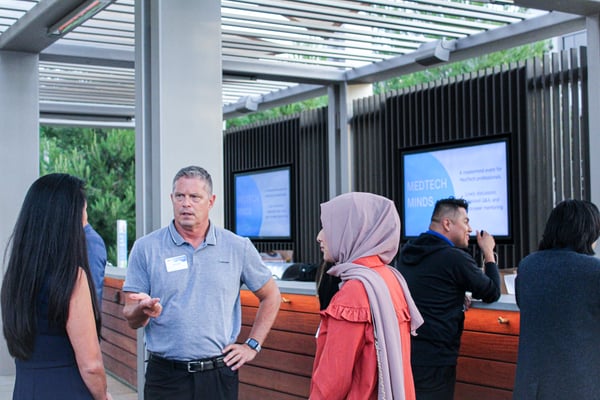As in any business endeavor, who you know is highly important for biotechnology startups, and therefore networking is essential.
Networking has become so important in modern business that an entire social network (LinkedIn) was developed to facilitate it in the digital age. However, because scientists are notoriously poor networkers, biotech startups sometimes don’t take full advantage of the networks they could be making.
Here we will examine the basics of networking:

🔬 Read: 11 Reasons Why Networking is Essential for Any Startup
Networking is a relatively new concept in human history. Until the industrial revolution, people generally lived in small communities where everyone knew each other and social positions were basically fixed at birth. But the industrial revolution brought about opportunities for trade and commerce with other parts of the world, so people began interacting with merchants and travelers they would otherwise never have met.
Therefore, people were entrusting the products of their labor to relative strangers, so the ability to determine who was trustworthy became of paramount importance. In a small community where everyone knows each other it’s difficult to get away with bad behavior, but in a global economy someone could claim they’re taking your product to sell but never actually return to you with the profits. How then, could a person determine if someone was trustworthy? This is where networking came in. The process of being introduced to someone by an already established acquaintance and getting to know them enough to trust their skills and integrity allowed people to participate in the industrial revolution successfully.
🔬 Learn: 7 Ways to Improve your Professional Network for Startup Success
Today, networking serves essentially the same purpose: to determine if someone is trustworthy enough to do business with. From meeting in a predetermined location, to participating in rituals, to exchanging information, networking seeks to make sure the person we’re meeting can be trusted.
In the modern era of business reviews on the internet and social media, it may seem like networking is outdated. However, businesses still have a huge trust component--especially startups. Starting a company is risky, and a single vendor or client can have an outsized impact on a small business. Therefore, working with those you trust is of utmost importance.
Today, networking can be boiled down to making connections with people in and related to your industry. However, there are many ways to define a “connection.” Is a connection merely an introduction? Is it taking an interest in getting to know someone? Is it developing a friendship? In terms of networking, making a connection means two people meeting, having a positive impression of each other, having something in common, and proceeding to keep in contact after the initial meeting.

Business development can be defined in many ways, but developing relationships with other companies is a common component. Networking events are a great way to meet potential partners, clients, and suppliers. Relationships of any kind require time and effort to develop, so it’s helpful for founders to start networking from the very beginning of their journey. You might meet someone who will end up being your best client in five years. Conversely, you might find out that someone tends to speak ill of their business partners and know to avoid working with them in the future.
🔬 Read: Biocom - How Industry Organizations Benefit Biotech Startups
One of the most important and sometimes difficult things that an entrepreneur can face is finding a cofounder. Ideally, a cofounder is someone you already know and have a good idea of how they work. However, sometimes the right person just isn’t in your circle of acquaintances. The next best option is to have someone you know and trust introduce you to people they know and trust. This is one of the best ways to use your network. It’s not only the people you know directly who are a part of your network, but also the people that they know.
Similarly, networks are fantastic for hiring. Especially when your company is small and every new hire is a large percentage of the team, making solid choices is imperative. If you can meet a candidate through someone who you already know, that is a great way to find quality employees. If you know you can trust a connection and they are willing to recommend a person to you, that person is more likely to fit the role. It’s like talking to a candidate’s reference before seeing their resume.
When you’re first starting or even just thinking about a new company, one of the essential questions to answer is whether the market wants what you’re selling. If you have built a network of people in your industry, you can discuss your idea with them and see what they think. Good market research also requires an approach that allows people to comfortably tell you they wouldn’t buy your product. So while a strong network is not the only thing you’ll need to conduct market research, it’s very helpful.
🔬Related: The Importance of Market Research in Biotech and Medtech Startups
A young company usually doesn’t have a lot in the way of backup supplies, equipment, or other resources, so having good relationships with others in your industry can come in very handy when equipment breaks, items are backordered, or an unexpectedly large request from a client comes in. People like to help others, especially when they’re helping someone they know and like.
Additionally, as a new founder you might want advice from time to time. Sure, you could reach out to people you don’t know via social media, but building a relationship with a few people who have been in your shoes before is likely to yield more benefits. They will get to know you and your company, and thus be better able to provide good advice. In turn, you’ll see whose advice seems to work best, and continue going to them with future questions.
.jpg?quality=low&width=600&name=IMG_2745%20(1).jpg)
For many scientists, entrepreneurs, and others, the importance of networking is clear. The problem is the execution. Walking into a room full of people that you don’t know is intimidating, but having a plan of action can help.
You can’t make a connection with someone you haven’t met, obviously, which is why most “networking events” are designed to facilitate introductions. Often, everyone is wearing a nametag and standing around. Some events even include colored stickers on the nametags that denote something about each person, such as which industry they are in, or why they are at the event.
If you’re just starting out building your network, you may not know where to look for networking events. Luckily the biotechnology industry has organizations that put on events for their members and sometimes offer free events to non-members too. In the Greater Los Angeles Area, there are three groups: Biocom, California Life Sciences, and SoCalBio. Each of these organizations holds events and can make connections between members. Additionally, Bioscience LA is a new non-profit organization that has events.
Free events are a great way to get started, especially if there is a presentation involved that you are interested in. That way you will get value out of the event even before you’ve met anyone! Also, asking the speaker a question after their presentation is a great way to make a connection.
🔬Related: Where to Find Life Science Events in Orange County
When you’re introducing yourself to someone at a networking event, look them in the eye and smile. Have a quick sentence about yourself and your company at the ready when they ask what you do. This is called an “elevator pitch” and is also useful when meeting investors. If shaking hands is appropriate, make sure to grasp their whole hand firmly but not too tightly, and let go after one or two seconds.
As you converse with your new acquaintance, your job is to listen to them rather than spend the time telling them about yourself. Listening well is a skill that can be developed with practice, so if you’re not adept at it yet don’t worry, you can get there. One of the best ways to show that you’re listening and encourage someone to tell you more about a topic is to repeat the last few words of their sentence. For example, if your new acquaintance says, “I just flew back from presenting at Biotech Showcase,” you could say, “Biotech Showcase?” This will encourage them to tell you more about the trip and show that you listened.
Watch other people’s body language to see if they are enjoying the conversation or not. Generally, a person will orient their feet and body toward a person they want to continue speaking with and away from that person if they are really just waiting for an opportune moment to excuse themselves. Don’t prolong a conversation with someone who is trying to get away.
If possible, either exchange business cards or make sure to note the person’s full name and ask if they are on LinkedIn. This way you’ll be able to contact them at a later date.
Meeting people is fantastic, but the real value of a strong network is realized when you keep in touch with them over time. In the day or two after you meet someone, send them an email or connect on LinkedIn. If you want to continue the conversation you were having, or if you have a specific subject you’d like to discuss, propose meeting again in the near future.
As time passes, check-in with the connections you see as the most relevant, valuable, or friendly. If you see them share news on social media, leave a comment. If something happens with you or your company that is particularly relevant to them, send them a quick message or share a link. Ideally, you’ll continue attending networking events where you will see the connections you’ve made again in real life and can continue strengthening your relationships.
Most importantly, if there is something simple you can do that would benefit your connections, do it, even if there’s no direct reward for you. The easiest thing is to introduce two people to each other that might have shared goals. With just an email you can provide value, and that generates goodwill toward you for the future. Reciprocity is natural, so if the people you have helped can help you down the road, they are likely to do so.
Download The Ultimate Guide to Wet Lab Incubators in Southern California, a handbook to assist life science start-ups through the entire decision-making process to find wet lab space.
Download Now